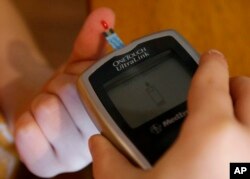There's not much middle ground on broccoli — people either love it or hate it.
U.S. President George H.W. Bush, for instance, was not a fan.
"I do not like broccoli," he famously said. "And I have not liked it since I was a little kid. And my mother made me eat it. And I am president of the United States. And I am not going to eat any more broccoli."
But there's no denying that it's a superfood.
And today, there's one more reason to love it: A compound found in broccoli appears to be at least as effective as a widely used drug to treat diabetes, according to Swedish researchers who think the ingredient could be a safe alternative for lowering blood sugar.
It turns out the green vegetable contains a chemical, called sulforaphane, that appears in clinical trials to work as well as metformin at reducing blood sugar levels in diabetics.
That could be good news for a significant percentage of the 300 million Type 2 diabetics around the world who cannot take metformin, a first-line therapy, because of potential kidney damage and stomach upset.
Dr. Anders Rosengren of the Lund University Diabetes Center in Sweden helped discover the potential of sulforaphane in lowering HA1c, a blood biomarker of long-term glucose control.
He led a team of researchers who used a computer model to sort through a public database of more than 3,800 promising compounds to find sulforaphane.
'Very exciting'
"We think this is very exciting. because there have been so many claims over the years of different food, dietary components having different health effects. We have really scientifically based proof that it has an effect on Type 2 diabetes," Rosengren said.
In a 12-week study of 97 patients with Type 2 diabetes, sulforaphane lowered HA1c levels by a relative reduction of 10 percent compared with levels in the control group.
In absolute terms, the metformin-only group saw a 23 percent lowering of their HA1c while the sulforaphane group had a 24 percent reduction. While that doesn't seem like much, it's enough to encourage researchers to keep pressing ahead with their studies, because it suggests that sulforaphane could work as well as metformin in reducing HA1c.
Even if that turns out not to be the case, Rosengren said, a combination of metformin and sulforaphane could work "synergistically" to drive blood sugar levels down better than metformin alone.
Because it would be unethical not to treat patients with a drug known to lower blood sugar, Rosengren said all of the participants in the study were on metformin, including the ones who got sulforaphane.
The findings were published in the journal Science Translational Medicine.
Rosengren said he looked forward to conducting another human clinical trial with pre-diabetic patients.
"If you were to have people without metformin at all, it might be that the sulforaphane might be even stronger," he said.
Quick approval seen
Both sulforaphane and metformin reduce glucose production by the liver, through a mechanism the body uses to ensure it has enough fuel during periods of fasting, like overnight. In diabetics who are also overweight, Rosengren said, the liver's glucose production function is not sensitive to the body's needs, and the liver dumps too much glucose into the bloodstream, causing unhealthy spikes in blood sugar levels.
Rosengren said that because sulforaphane is natural, known to be safe and has no known side effects, he thinks it could be approved as a blood sugar-lowering agent by U.S. and European regulators in the next year or two.
Those who are ready to start eating broccoli with an eye toward reducing blood sugar should know this: Rosengren said average portions of the cruciferous vegetable would not be enough. In the study, researchers gave subjects up to five kilograms of sulforaphane extracted from broccoli sprouts, an amount that would be difficult to consume in a day, except in pill form.
For diabetics who hate broccoli, that could be an answer to their dilemma.





